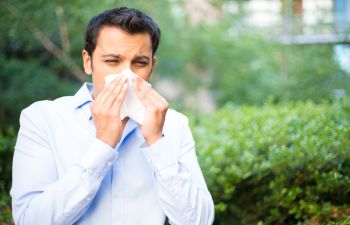
If you suffer from sleep apnea, you probably already know that allergies can add even more problems with breathing properly while you sleep. Getting oxygen gets difficult when your nose and throat are both obstructed.
Sleep Apnea Basics
Sleep apnea means you have a breathing problem while you are asleep. When we fall asleep, our entire body relaxes. However, when the muscles in the throat relax more than they should, they block the airway, sometimes lasting 10 to 30 seconds. This sudden blockage causes the sufferer to wake up to restore proper breathing. As a result, you can wake up as many as 400 times a night, which leads to a lack of restful, restorative sleep.
Most people find out they have sleep apnea after seeing a doctor about their poor sleep or when their partner sends them in because of snoring. It’s common for people with sleep apnea to snore as the muscles in the tongue, the roof of the mouth and the throat relax and narrow the airway. As the airway is narrowed, the tissue vibrates. The greater the narrowing, the louder the snoring.
Not everyone who snores has sleep apnea. However, if the snoring is accompanied by other symptoms such as excessive sleepiness, poor concentration, high blood pressure, chest pain at night or a sore throat when you wake up, you should see a sleep specialist about scheduling a sleep study.
Common Allergies Plus Sleep Apnea Combine for Misery
Common allergies like pet dander, pollen, dust mites and mold cause the nasal passages to swell as the nose tries to block or flush out the allergens. Swollen nasal passages make breathing through the nose more difficult and cause you to breathe through your mouth. If the mouth and throat are obstructed due to those relaxed muscles and the nasal passages are obstructed due to allergies, it’s easy to see how quickly breathing can become a significant issue.
Treat Your Allergies and Reduce the Apnea
The first thing you can do is treat your allergies. Over-the-counter allergy medicine is sufficient for many sufferers to calm down the nasal passages. Others will need to see a doctor to determine what is causing their allergy and how best to treat it.
Home remedies won’t solve your problems but adding a humidifier to your room at night may help. In addition, using an OTC antihistamine or decongestant can bring some relief.
The best thing you can do if you are struggling with allergies or sleep apnea is to see a doctor specializing in sleep apnea. The Atlanta Sleep Apnea Treatment Center can help diagnose and treat your sleep apnea. Contact us today for a free consultation.
Posted on behalf of
1820 The Exchange SE, #600
Atlanta, GA 30339
Phone: (678) 401-7615
Mon - Thu: 8:30 AM – 5:30 PM
Closed for lunch: 12:30 PM - 1:30 PM
